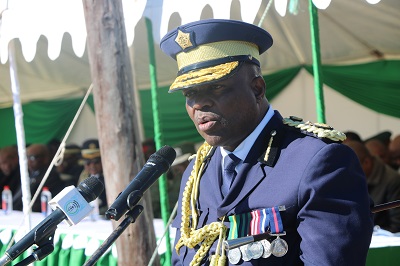By: Thoboloko Ntšonyane
MASERU – Commissioner of Police (COMPOL) Holomo Molibeli has retired from the helm of the Lesotho Mounted Police Service (LMPS) after 36 years of service and six years as the head of this institution.
He stepped down on February 23.
In 1988 when he joined the LMPS as a junior officer, Molibeli rose through the ranks until he was appointed the COMPOL, the highest rank within the LMPS.
Deputy Commissioner of Police (DCP) Dr Mahlape Morai has been appointed as the Acting COMPOL, the position she will hold until the substantive has been chosen.
Dr Morai becomes the second woman to hold that position after the retired Commissioner ‘Malejaka Letooane.
One of the successes of Molibeli at the helm of the LMPS was to forge a working relationship with the Rwanda National Police (RNP) where both institutions signed a Memorandum of Understanding (MoU) in 2021 to formalize their cooperation. The areas of cooperation include partnership against terrorism, organized and transnational crimes, capacity building in community policing, exchange of information and expertise, training opportunities and expertise development.
Also, LMPS and the National University of Lesotho (NUL)’s Faculty of Law in April last year had entered into a partnership which will see the latter developing a curriculum for the LMPS.
Under his leadership, the United States Federal Bureau of Investigation (FBI) supported the LMPS through mounting training and donating the fingerprints kits.
Molibeli’s era was characterized by lawsuits instituted by the members of the public who felt aggrieved by the treatment of police, some of whom are notorious for perpetrating human rights violations with reports of suspects dying in police custody.
There was also a shocking incident where a suspect was tortured by the police until he soiled himself and was allegedly forced to eat his own stool.
In 2023, Amnesty International reported that it had “documented human rights violations committed by police officers, ranging from unlawful killings, torture, and cruel, inhuman and degrading treatment of persons in detention. Amnesty International also documented cases where police authorities either neglected or refused to investigate allegations of torture, ill-treatment, and deaths in custody.”
In 2021, the World Population Review published a report that painted a bleak picture on Lesotho positioning it as the sixth highest murder rate in the world. Lesotho now occupies the third position with the highest murder rate by country with 43.56 murder rate per 100 000 people.
As if this was not enough, there were reports that 75 guns were stolen at Mafeteng Police Station armory, some of those were allegedly linked to the Famo gangs. The police officers who had a hand in the disappearance of the guns were subjected to disciplinary measures and taken before the courts.
Molibeli was no stranger to “show cause” letters that attempted to fire him.


